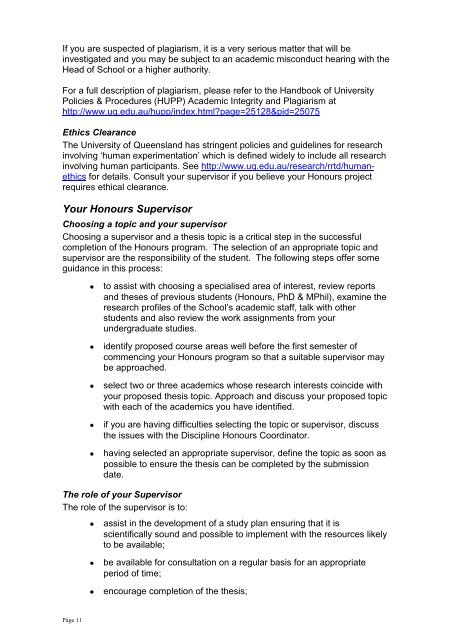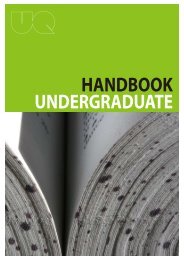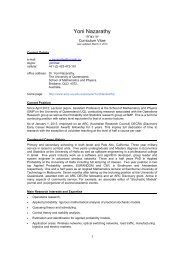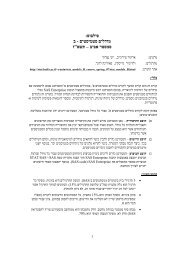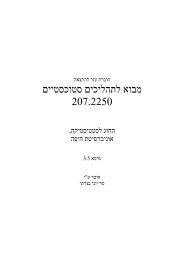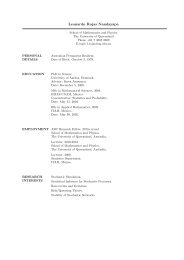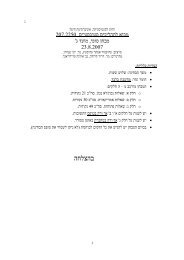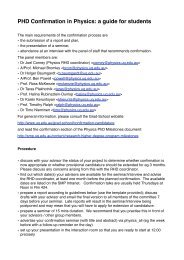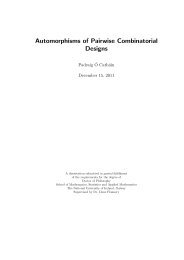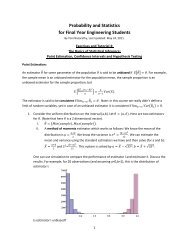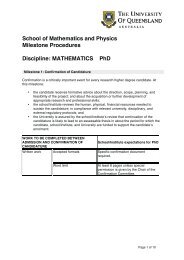2012 Handbook Honours - School of Mathematics and Physics ...
2012 Handbook Honours - School of Mathematics and Physics ...
2012 Handbook Honours - School of Mathematics and Physics ...
Create successful ePaper yourself
Turn your PDF publications into a flip-book with our unique Google optimized e-Paper software.
If you are suspected <strong>of</strong> plagiarism, it is a very serious matter that will be<br />
investigated <strong>and</strong> you may be subject to an academic misconduct hearing with the<br />
Head <strong>of</strong> <strong>School</strong> or a higher authority.<br />
For a full description <strong>of</strong> plagiarism, please refer to the <strong>H<strong>and</strong>book</strong> <strong>of</strong> University<br />
Policies & Procedures (HUPP) Academic Integrity <strong>and</strong> Plagiarism at<br />
http://www.uq.edu.au/hupp/index.html?page=25128&pid=25075<br />
Ethics Clearance<br />
The University <strong>of</strong> Queensl<strong>and</strong> has stringent policies <strong>and</strong> guidelines for research<br />
involving ‘human experimentation’ which is defined widely to include all research<br />
involving human participants. See http://www.uq.edu.au/research/rrtd/humanethics<br />
for details. Consult your supervisor if you believe your <strong>Honours</strong> project<br />
requires ethical clearance.<br />
Your <strong>Honours</strong> Supervisor<br />
Choosing a topic <strong>and</strong> your supervisor<br />
Choosing a supervisor <strong>and</strong> a thesis topic is a critical step in the successful<br />
completion <strong>of</strong> the <strong>Honours</strong> program. The selection <strong>of</strong> an appropriate topic <strong>and</strong><br />
supervisor are the responsibility <strong>of</strong> the student. The following steps <strong>of</strong>fer some<br />
guidance in this process:<br />
• to assist with choosing a specialised area <strong>of</strong> interest, review reports<br />
<strong>and</strong> theses <strong>of</strong> previous students (<strong>Honours</strong>, PhD & MPhil), examine the<br />
research pr<strong>of</strong>iles <strong>of</strong> the <strong>School</strong>’s academic staff, talk with other<br />
students <strong>and</strong> also review the work assignments from your<br />
undergraduate studies.<br />
• identify proposed course areas well before the first semester <strong>of</strong><br />
commencing your <strong>Honours</strong> program so that a suitable supervisor may<br />
be approached.<br />
• select two or three academics whose research interests coincide with<br />
your proposed thesis topic. Approach <strong>and</strong> discuss your proposed topic<br />
with each <strong>of</strong> the academics you have identified.<br />
• if you are having difficulties selecting the topic or supervisor, discuss<br />
the issues with the Discipline <strong>Honours</strong> Coordinator.<br />
• having selected an appropriate supervisor, define the topic as soon as<br />
possible to ensure the thesis can be completed by the submission<br />
date.<br />
The role <strong>of</strong> your Supervisor<br />
The role <strong>of</strong> the supervisor is to:<br />
• assist in the development <strong>of</strong> a study plan ensuring that it is<br />
scientifically sound <strong>and</strong> possible to implement with the resources likely<br />
to be available;<br />
• be available for consultation on a regular basis for an appropriate<br />
period <strong>of</strong> time;<br />
• encourage completion <strong>of</strong> the thesis;<br />
Page 11


